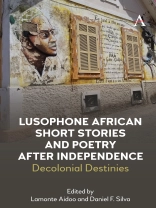In 1975, after much resistance, Portugal became the last colonial power to relinquish their colonies on the African continent. The tardiness of Portuguese decolonization in Africa (Cabo Verde, Angola, Mozambique, Guinea Bissau, São Tomé and Príncipe) raises critical questions for the emergence of national literary and cultural production in the wake of national independence. Bringing together the works of poets, short story writers, and journalists, this book charts the emergence and evolution of the national literatures of Portugal’s former African colonies, from 1975 to the present. The aim of this book is to examine the ways in which writers contended with the process of decolonization, forging national, transnational, and diasporic identities through literature while grappling with the legacies and continuities of racial power structures, colonial systems of representation, and the struggles for political sovereignty and social justice. This book will be the first of its kind in English to include canonical, emerging, and previously untranslated authors of poetry and short-form fiction to a new public.
Lusophone African Short Stories will bring to light and to broader audiences the important artistic engagement of writers from five African nations that are largely neglected outside the field of Lusophone Studies – Angola, Cabo Verde, Guinea-Bissau, Mozambique, and São Tomé e Príncipe. The literary production emanating from these locales offers perspectives and novel forms of engagement against the forces and legacies of Empire in the nearly five decades of postcolonial independence. The collection will make available to new readerships, scholars, and students, canonical and emerging literary thought and works that are borne out of the persistent struggle against imperialism and its racial, gender, sexual, and socioeconomic tenets. In this regard, the collection will feature an array of literary voices, genres, and aesthetics including novels, poetry, science fiction, Afro-Futurism, and postcolonial feminism. These recent artistic trends, we argue, are integral tools for individual and collective grappling with the political, societal, micro- and macro-economic, and cultural challenges of the postcolonial present. They have become modes of imagining communal subjectivity in new ways from the periphery of global capitalism and against forces of neocolonialism.
Tabela de Conteúdo
Introduction; PART I. ANGOLA; Chapter 1. Boaventura Cardoso; Chapter 2. Ana Paula Tavares; Chapter 3. Ana de Santana; Chapter 4. Amélia da Lomba; Chapter 5. Ondjaki; PART II. CABO VERDE; Chapter 6. Onésimo Silveira; Chapter 7. Vera Duarte; Chapter 8. Rosendo Évora Brito; Chapter 9. Orlanda Amarilis; Chapter 10. Silvino Lopes Évora; PART III. GUINEA-BISSAU; Chapter 11. Domingas Samy; Chapter 12. Agnelo Regalla; Chapter 13. Félix Sigá; Chapter 14. Tony Tcheka; Chapter 15. Odete Semedo; PART IV. MOZAMBIQUE; Chapter 16. José Craveirinha; Chapter 17. Mia Couto; Chapter 18. Paulina Chiziane; Chapter 19. Tânia Tomé; Chapter 20. Nelson Saúte; PART V. SÃO TOMÉ E PRÍNCIPE; Chapter 21. Alda Espírito Santo; Chapter 22. Tomás Medeiros; Chapter 23. Olinda Beja; Chapter 24. Conceição Lima; Chapter 25. Albertino Bragança; Further Reading; Bibliography.
Sobre o autor
Lamonte Aidoo is Associate Professor of Romance Studies at Duke University.
Daniel F. Silva is Associate Professor of Luso-Hispanic Studies at Middlebury College











![Capa do ]. R. Morgan & Richard Stoneman: Greek Fiction Capa do ]. R. Morgan & Richard Stoneman: Greek Fiction](https://static.worldofdigitals.com/thumb_webp/368/9781317799368.webp)
